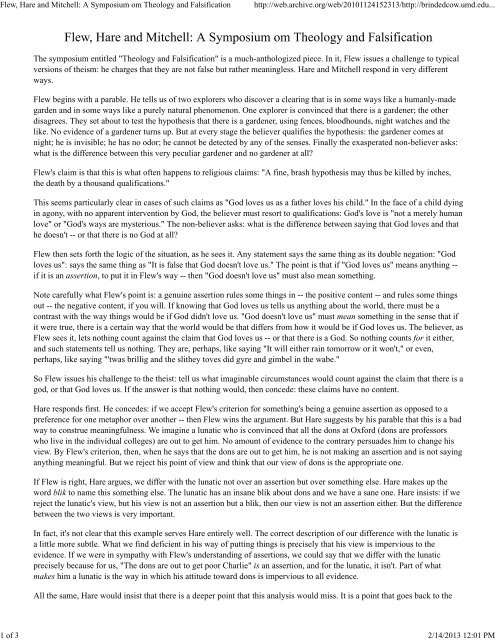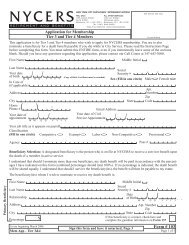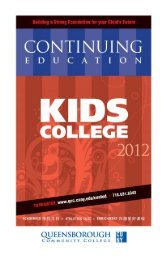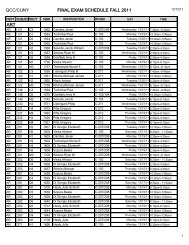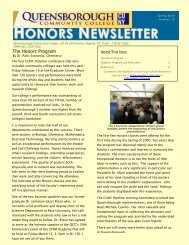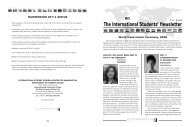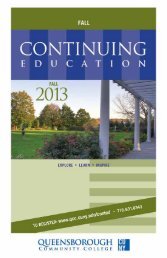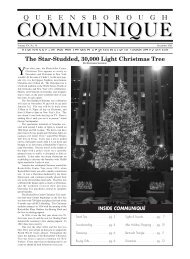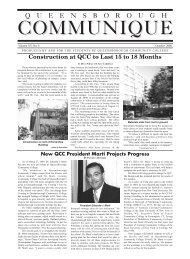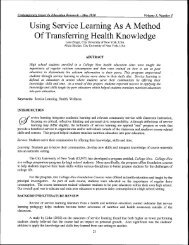Symposium on Theology and Falsification
Symposium on Theology and Falsification
Symposium on Theology and Falsification
Create successful ePaper yourself
Turn your PDF publications into a flip-book with our unique Google optimized e-Paper software.
Flew, Hare <strong>and</strong> Mitchell: A <str<strong>on</strong>g>Symposium</str<strong>on</strong>g> om <strong>Theology</strong> <strong>and</strong> Falsificati<strong>on</strong> http://web.archive.org/web/20101124152313/http://brindedcow.umd.edu...<br />
The symposium entitled "<strong>Theology</strong> <strong>and</strong> Falsificati<strong>on</strong>" is a much-anthologized piece. In it, Flew issues a challenge to typical<br />
versi<strong>on</strong>s of theism: he charges that they are not false but rather meaningless. Hare <strong>and</strong> Mitchell resp<strong>on</strong>d in very different<br />
ways.<br />
Flew begins with a parable. He tells us of two explorers who discover a clearing that is in some ways like a humanly-made<br />
garden <strong>and</strong> in some ways like a purely natural phenomen<strong>on</strong>. One explorer is c<strong>on</strong>vinced that there is a gardener; the other<br />
disagrees. They set about to test the hypothesis that there is a gardener, using fences, bloodhounds, night watches <strong>and</strong> the<br />
like. No evidence of a gardener turns up. But at every stage the believer qualifies the hypothesis: the gardener comes at<br />
night; he is invisible; he has no odor; he cannot be detected by any of the senses. Finally the exasperated n<strong>on</strong>-believer asks:<br />
what is the difference between this very peculiar gardener <strong>and</strong> no gardener at all?<br />
Flew's claim is that this is what often happens to religious claims: "A fine, brash hypothesis may thus be killed by inches,<br />
the death by a thous<strong>and</strong> qualificati<strong>on</strong>s."<br />
This seems particularly clear in cases of such claims as "God loves us as a father loves his child." In the face of a child dying<br />
in ag<strong>on</strong>y, with no apparent interventi<strong>on</strong> by God, the believer must resort to qualificati<strong>on</strong>s: God's love is "not a merely human<br />
love" or "God's ways are mysterious." The n<strong>on</strong>-believer asks: what is the difference between saying that God loves <strong>and</strong> that<br />
he doesn't -- or that there is no God at all?<br />
Flew then sets forth the logic of the situati<strong>on</strong>, as he sees it. Any statement says the same thing as its double negati<strong>on</strong>: "God<br />
loves us": says the same thing as "It is false that God doesn't love us." The point is that if "God loves us" means anything -if<br />
it is an asserti<strong>on</strong>, to put it in Flew's way -- then "God doesn't love us" must also mean something.<br />
Note carefully what Flew's point is: a genuine asserti<strong>on</strong> rules some things in -- the positive c<strong>on</strong>tent -- <strong>and</strong> rules some things<br />
out -- the negative c<strong>on</strong>tent, if you will. If knowing that God loves us tells us anything about the world, there must be a<br />
c<strong>on</strong>trast with the way things would be if God didn't love us. "God doesn't love us" must mean something in the sense that if<br />
it were true, there is a certain way that the world would be that differs from how it would be if God loves us. The believer, as<br />
Flew sees it, lets nothing count against the claim that God loves us -- or that there is a God. So nothing counts for it either,<br />
<strong>and</strong> such statements tell us nothing. They are, perhaps, like saying "It will either rain tomorrow or it w<strong>on</strong>'t," or even,<br />
perhaps, like saying "'twas brillig <strong>and</strong> the slithey toves did gyre <strong>and</strong> gimbel in the wabe."<br />
So Flew issues his challenge to the theist: tell us what imaginable circumstances would count against the claim that there is a<br />
god, or that God loves us. If the answer is that nothing would, then c<strong>on</strong>cede: these claims have no c<strong>on</strong>tent.<br />
Hare resp<strong>on</strong>ds first. He c<strong>on</strong>cedes: if we accept Flew's criteri<strong>on</strong> for something's being a genuine asserti<strong>on</strong> as opposed to a<br />
preference for <strong>on</strong>e metaphor over another -- then Flew wins the argument. But Hare suggests by his parable that this is a bad<br />
way to c<strong>on</strong>strue meaningfulness. We imagine a lunatic who is c<strong>on</strong>vinced that all the d<strong>on</strong>s at Oxford (d<strong>on</strong>s are professors<br />
who live in the individual colleges) are out to get him. No amount of evidence to the c<strong>on</strong>trary persuades him to change his<br />
view. By Flew's criteri<strong>on</strong>, then, when he says that the d<strong>on</strong>s are out to get him, he is not making an asserti<strong>on</strong> <strong>and</strong> is not saying<br />
anything meaningful. But we reject his point of view <strong>and</strong> think that our view of d<strong>on</strong>s is the appropriate <strong>on</strong>e.<br />
If Flew is right, Hare argues, we differ with the lunatic not over an asserti<strong>on</strong> but over something else. Hare makes up the<br />
word blik to name this something else. The lunatic has an insane blik about d<strong>on</strong>s <strong>and</strong> we have a sane <strong>on</strong>e. Hare insists: if we<br />
reject the lunatic's view, but his view is not an asserti<strong>on</strong> but a blik, then our view is not an asserti<strong>on</strong> either. But the difference<br />
between the two views is very important.<br />
In fact, it's not clear that this example serves Hare entirely well. The correct descripti<strong>on</strong> of our difference with the lunatic is<br />
a little more subtle. What we find deficient in his way of putting things is precisely that his view is impervious to the<br />
evidence. If we were in sympathy with Flew's underst<strong>and</strong>ing of asserti<strong>on</strong>s, we could say that we differ with the lunatic<br />
precisely because for us, "The d<strong>on</strong>s are out to get poor Charlie" is an asserti<strong>on</strong>, <strong>and</strong> for the lunatic, it isn't. Part of what<br />
makes him a lunatic is the way in which his attitude toward d<strong>on</strong>s is impervious to all evidence.<br />
All the same, Hare would insist that there is a deeper point that this analysis would miss. It is a point that goes back to the<br />
1 of 3 2/14/2013 12:01 PM
Flew, Hare <strong>and</strong> Mitchell: A <str<strong>on</strong>g>Symposium</str<strong>on</strong>g> om <strong>Theology</strong> <strong>and</strong> Falsificati<strong>on</strong> http://web.archive.org/web/20101124152313/http://brindedcow.umd.edu...<br />
18th century Scottish philosopher David Hume. Think abut what it means to base <strong>on</strong>e's belief <strong>on</strong> evidence. In most cases, it<br />
amounts to the view that we can infer the future from the past, <strong>and</strong> more generally that we can infer facts about the larger<br />
world <strong>on</strong> the basis of a sample. Why do we think the sun will rise tomorrow? Becuase it always has. Why do we think that<br />
sugar will dissolve in water? Becuase up to now it has always d<strong>on</strong>e so. Our belief -- if that's what it should be called -- that a<br />
part can serve as evidence of the whole is <strong>on</strong>e that all reas<strong>on</strong>ing about the world must presuppose. It is <strong>on</strong>e that we cannot<br />
prove by evidence, because we would have to presuppose it in order to reas<strong>on</strong> from the evidence.<br />
But now turn things around. C<strong>on</strong>sider the opposite belief: that the past is no guide to the future; that the part is no guide to<br />
the whole. Since the belief that the past does provide guidance to the future, <strong>and</strong> that the sample does tell us things about the<br />
larger populati<strong>on</strong> is <strong>on</strong>e that evidence can't establish, then by Flew's criteri<strong>on</strong>, the opposite view isn't an asserti<strong>on</strong>. But in that<br />
case, the view that we can use the past to reas<strong>on</strong> about the future, the part to reas<strong>on</strong> about the whole, <strong>and</strong> in general that<br />
scientific or ordinary "inductive" reas<strong>on</strong>ing is possible is also not an asserti<strong>on</strong>. But even if it isn't it is clearly a tremendously<br />
significant attitude in a perfectly familiar sense of "significant."<br />
Hare's point, then, is that we d<strong>on</strong>'t necessarily delegitimize a view just by showing that it isn't an asserti<strong>on</strong> in Flew's sense.<br />
Some of our most important attitudes are clearly legitimate even if they d<strong>on</strong>'t count as being asserti<strong>on</strong>s by Flew's lights.<br />
Hare makes the point by explicit reference to Hume in a part of the text that Robins<strong>on</strong> left out. (Click here to read it<br />
yourself.) But he illustrates in a straightforward way. We have a certain c<strong>on</strong>fidence in the stability of things like steel, which<br />
leads us to think that our steering column w<strong>on</strong>'t all of a sudden turn to rubber. More generally, we have a certain c<strong>on</strong>fidence<br />
in the stability of nature. But would we ever c<strong>on</strong>clude that nature is not law-governed? Would we ever let anything count as<br />
evidence against our view that the world is stable? Hare thinks not. This view is therefore not an asserti<strong>on</strong> by Flew's<br />
criteri<strong>on</strong>. But that hardly puts it in the category of meaninglessness in the pejorative sense.<br />
Hare sees religious belief as of the same sort. In a porti<strong>on</strong> of his reply that Robins<strong>on</strong> did not reproduce, he makes it clear: he<br />
rejects the idea of God as cosmic architect.<br />
What does he believe instead? He adverts to Biblical language: "The earth is the Lord's <strong>and</strong> the pillars thereof." There are<br />
two things (at least) at work here. One is the influence of such 20th century philosophers as Paul Tillich. Tillich insisted that<br />
as so<strong>on</strong> as we identify God with any thing, we have stooped to idolatry. The idea that God is not just <strong>on</strong>e more thing in the<br />
universe is actually a very old <strong>on</strong>e. St. Thomas Aquinas certainly accepted it, <strong>and</strong> he was by no means the first. The mystics,<br />
as Karen Armstr<strong>on</strong>g makes clear n her book A History of God, would have accepted it too (or many of them would have.)<br />
Tillich tried to take this idea <strong>and</strong> make it into the basis of a systematic theology. He often did not use the word "God" at all,<br />
talking instead of "the ground of being." On his view, God was bey<strong>on</strong>d all possibility of literal descripti<strong>on</strong>. We could use<br />
symbols to gesture at the reality we sometimes call God, but no symbol can do any more than gesture at the ground of being.<br />
It seems quite clear that Tillich's influence is present in Hare, but there is another strain of thought that shows up there too.<br />
A number of 20th century philosophers of religi<strong>on</strong> argued that religi<strong>on</strong> is a particular "form of life" -- a term from Ludwig<br />
Wittgenstein -- <strong>and</strong> that religious language cannot be understood outside that form of life. So the language of the psalms, as<br />
part of the religious form of life, is a perfectly good way for a religious pers<strong>on</strong> to express his or her religious attitude. But to<br />
take that language <strong>and</strong> dissect it to discover whether it is borne out by the evidence is to play a quite different language<br />
game (another Wittgensteinian phrase) -- to step outside the form of life in which religious language has meaning.<br />
There is something to this, <strong>on</strong>e might think. It would explain why it is that religious believers <strong>and</strong> n<strong>on</strong>-believers often seem<br />
simply to talk past <strong>on</strong>e another. However, Flew points out that what Hare has in mind is actually quite unorthodox. Whether<br />
this is a good thing or a bad thing, it is surely true by the st<strong>and</strong>ards of Western Christianity, or at least by the st<strong>and</strong>ards of the<br />
typical believer.<br />
Does that matter? It's hard to say. With Armstr<strong>on</strong>g in the background, we can say that Hare in fact seems to be in a l<strong>on</strong>g line<br />
that distinguishes between picturesque talk about God <strong>and</strong> the inaccessible nature of the divine itself. The orthodoxy that<br />
Flew points to, Armstr<strong>on</strong>g might insist, is just the exoteric or outer versi<strong>on</strong> of religi<strong>on</strong> as opposed to its mystical core. (In<br />
Eastern Orthodox Christianity, this difference might be described as a difference between kerygma -- the explicitly<br />
proclaimed religi<strong>on</strong> -- <strong>and</strong> dogma -- the deeper truth.<br />
We can push in another directi<strong>on</strong>, in any case. Flew seems to be saying: in order for a statement to be meaningful -- to be a<br />
2 of 3 2/14/2013 12:01 PM
Flew, Hare <strong>and</strong> Mitchell: A <str<strong>on</strong>g>Symposium</str<strong>on</strong>g> om <strong>Theology</strong> <strong>and</strong> Falsificati<strong>on</strong> http://web.archive.org/web/20101124152313/http://brindedcow.umd.edu...<br />
genuine asserti<strong>on</strong> -- there must be things that would count against its truth. But some have asked: what is the status of that<br />
sort of statement? Is Flew's criteri<strong>on</strong> of meaningfulness itself meaningful by his own st<strong>and</strong>ard? What would count as<br />
evidence against it? And if the answer is "nothing," where does this leave Flew's argument?<br />
There are various sorts of replies that Flew might make -- that principles of meaningfulness are not meant to describe the<br />
world, for example, but to do some other sort of job. But Hare's resp<strong>on</strong>se, in effect, is that the same is true of religious<br />
asserti<strong>on</strong>s. The questi<strong>on</strong> is whether this can be quite right. Are religious asserti<strong>on</strong>s really not intended to c<strong>on</strong>vey any<br />
informati<strong>on</strong> about the world?<br />
This is an irresolvable debate. The mystic or the Tillichian theologian might insist that insofar as religious statements are<br />
simply descripti<strong>on</strong>s, they are not truly religious statements -- they c<strong>on</strong>fuse God with something less than ultimate. But does<br />
that mean that any way the world might be is compatible with religi<strong>on</strong>?<br />
Perhaps the answer is yes. After all, it might be pointed out that the <strong>on</strong>tological argument claims that God exists necessarily<br />
--indeed that God's n<strong>on</strong>-existence is inc<strong>on</strong>ceivable. If that is so, nothing could count as evidence against God's existence.<br />
Here it might be complained: Anselm was guilty of doing just what the mystics <strong>and</strong> the Tillichians complain about: making<br />
God into a particularly glorious object. However, it isn't clear that this is true either. The being than which n<strong>on</strong>e greater can<br />
be c<strong>on</strong>ceived, if there is such, is truly in a category by itself -- like nothing else.<br />
What we see here, then, is that Flew's criteri<strong>on</strong> has genuine appeal -- we somehow feel that statements about God should be<br />
genuine asserti<strong>on</strong>s, <strong>and</strong> should c<strong>on</strong>vey genuine informati<strong>on</strong>. But we also see that, in historical perspective, it is not at all<br />
clear that statements about God have simply been intended as asserti<strong>on</strong>s by all those who made them.<br />
Mitchell's reply is much more straightforward. He agrees that statements about God should be asserti<strong>on</strong>s by Flew's st<strong>and</strong>ard,<br />
<strong>and</strong> he insists that evil, for example, does count against the asserti<strong>on</strong> that God loves us. His parable is meant to do a different<br />
job than Hare's. It is meant to suggest that Flew has overlooked an attitude that is different from simply treating religious<br />
statements as hypotheses, <strong>and</strong> different from treating them as mere manners of speaking. The believer in God, like the<br />
believer in the Stranger of Mitchell's parable, has an attitude of trust. The actual evidence is ambiguous. Some things<br />
suggest that the stranger is <strong>on</strong> the side of the resistance, some things suggest that he isn't. But the partisan in Mitchell's<br />
parable as been moved by the stranger enough to trust that even when it seems otherwise, the stranger really is <strong>on</strong> his side.<br />
The religious believer has a similar attitude of trust in God, Mitchell claims. The trust is not without a sense of tensi<strong>on</strong> <strong>and</strong><br />
c<strong>on</strong>flict -- if it were, it would be the sort of meaningless n<strong>on</strong>-asserti<strong>on</strong> that Flew attacks. But the believer has committed<br />
himself or herself to not ab<strong>and</strong><strong>on</strong>ing belief in the face of seeming evidence to the c<strong>on</strong>trary, because the believer has adopted<br />
an attitude of faith.<br />
Flew sees the analogy as flawed. The stranger is a limited mortal. That makes it easy to explain why he does not always<br />
appear to be <strong>on</strong> our side. But God is not limited in any way; no excuses could be made for God's lapses. However, Mitchell<br />
could surely point out: it isn't a matter of making specific excuses. It is a matter of having faith that there is some<br />
explanati<strong>on</strong>, even if we can't see what it is -- of saying that we d<strong>on</strong>'t underst<strong>and</strong>, but we trust. The questi<strong>on</strong> Flew would<br />
presumably ask is: d<strong>on</strong>'t we underst<strong>and</strong> well enough?<br />
But answering that questi<strong>on</strong> is not the task of these notes.<br />
© Copyright 1998, Allen Stairs. All Rights Reserved<br />
stairs@glue.umd.edu<br />
Back to the Main Page<br />
3 of 3 2/14/2013 12:01 PM


